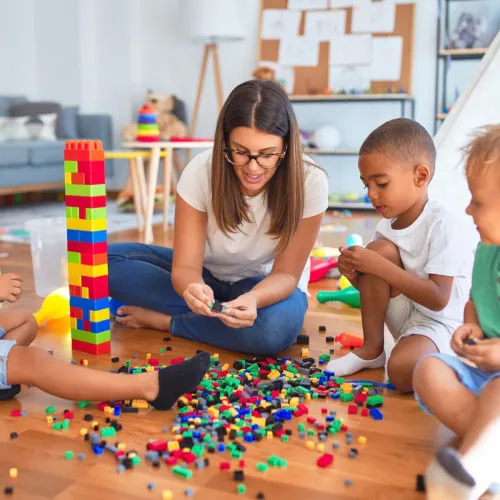A "Do No Harm" Model for Shared Parenting

Many divorcing parents find themselves in the challenging spot of trying to raise their children together while struggling to do so cooperatively. Parents who are constantly engaged in conflict might find that actually stepping back and giving each other space to parent independently may end up serving their family better in the long run. Still, the need to maintain some form of connection remains, as even divorced parents often need to continue sharing information about their children.
Brook Olsen, founder of the High Conflict Diversion Program™, has one basic for parents facing this situation: to disengage from one another. Detaching from each other and changing the way they communicate can separate parents from conflict and give them a chance to regain a clear perspective.
Understanding conflict and how to disengage from it
Through instructing parents on the High Conflict Diversion Program™ and his work as a divorce coach, Brook teaches concepts that can reduce conflict, but he also helps parents understand why conflict persists.
"Conflict is inherent in our nervous system," says Brook. "Without being able to have the tools to understand what's going on for ourselves as well as what's happening for the other person in that cycle, it's an incomplete teaching."
When parents in conflict disengage from one another and lead parallel lives, they have a chance to heal and focus on what they each need to do to improve as individuals.
As opposed to interactive co-parenting, parallel parenting is an approach that can give parents the space they need to disentangle themselves emotionally while still playing active roles in raising their children.
Brook describes parallel parenting as a "do no harm" model. "In the beginning," he explains, "parallel parenting gives parents a chance to have autonomy, get their feet on the ground, look at what's important, and become better parents individually regardless of what the other parent is doing."
While the definition of parallel parenting calls for parents to disengage, how can they do so effectively while still sharing the information they need about their children?
Electronic forms of communication and information sharing can help parents overcome this hurdle, but not all methods are capable of diminishing tension.
Pitfalls of traditional communication platforms
As Brook explains, the downside to using regular email, text messaging, or phone calls has to do with the reactivity of the parents. "I think that the problem is a lack of consciousness and an inability to hack that reactivity, to step away from that type of contact," says Brook. "Text messaging, in particular, is almost like having a conversation. The parents get in and go back and forth as if they were on the phone or face-to-face. That just allows for each parent to really ramp up their argumentative process."
Email, on the other hand, can allow for long-form communication that's more carefully crafted, but it can also open the door to other issues if the conversations aren't secured.
As Brook explains, "There is an opportunity to go in and manipulate the email and the threads to put things in an order that isn’t necessarily what exactly happened."
While email chains and text messages are not unusable for tracking communication between parents, other platforms like OurFamilyWizard do more to protect the integrity of information and organize it so that it's readily usable in meetings with practitioners or for court.
Capturing parallel parenting communication on OurFamilyWizard
"OurFamilyWizard creates a tool that helps the parents step away from that automatic, instantaneous, unregulated contact," says Brook. "It allows them the opportunity to really step back, settle down, and not say things that are going to create more conflict and keep them going back and forth in an argumentative manner."
Brook refers to OurFamilyWizard as a "capture tool" for communication between parents, keeping entries secured in case they must be referred to later on.
"The ability for someone to come in and manipulate the information disappears," he says. "I think that this is important today because when parents are in a high-conflict cycle, I've seen people go back and manipulate their email to create a different message. This muddies the waters. Having OurFamilyWizard as the primary level of communication between parents—or the only form of communication—eliminates these possibilities."
Changing parenting behavior through improved communication
When working with clients, communication contained on OurFamilyWizard aids Brook in identifying potential sources of conflict. "Often times, I help my clients get ready for Family Court Services in San Diego, which is a system that parents go in to meet with a court mediator. If I have access to OurFamilyWizard, it gives me the material that I need to help my clients focus on what's important for that meeting."
Even in a parallel parenting arrangement where limited communication is suggested, Brook understands that parents may not always abide by this rule of thumb.
"Even OurFamilyWizard can be a place where argumentative patterns continue," he says. He encourages his clients to reduce this behavior by limiting the number of times they open and view communication within the app to once a day unless something comes through that is of particular importance.
Parallel parenting may be a temporary strategy to help parents reach a place where they can begin working together more closely in raising their children, yet Brook believes that there is more to it than just reforming communication and reducing conflict. "I think that even parents that co-parent and have more communication have some level of different parenting styles," he says.
As he recommends OurFamilyWizard to house their parallel parenting communication, he encourages his clients to take parenting classes to help them reach a more cohesive parenting style. Through parallel parenting in tandem with classes, Brook believes that parents can focus on doing their best to each become better parents individually and focus on what their children need as they move toward traditional co-parenting.
"I want to set boundaries with the use of any form of communication between the parents," he explains. "This allows them more of an ability to get into their own lives, to stay out of the argument, to go to work, to be with their kids, to have fun, and to get their nervous system in a place where it's not fired up all the time."

NOTE: Many state and federal laws use terms like ‘custody’ when referring to arrangements regarding parenting time and decision-making for a child. While this has been the case for many years, these are not the only terms currently used to refer to these topics.
Today, many family law practitioners and even laws within certain states use terms such as ‘parenting arrangements’ or ‘parenting responsibility,’ among others, when referring to matters surrounding legal and physical child custody. You will find these terms as well as custody used on the OurFamilyWizard website.






